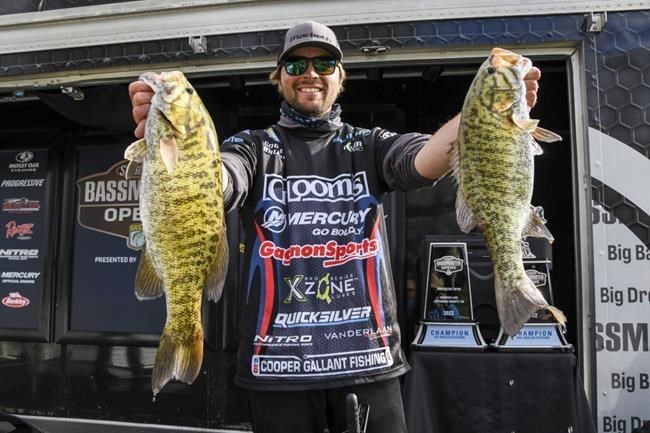Attention to detail paid off Saturday for Canadian Cooper Gallant.
The 24-year-old from Bowmanville, Ont., entered the final day of the Bassmaster Southern Open event on Cherokee Lake at Jefferson County, Tenn., in eighth spot overall. But after needing just 30 minutes to land his five-fish limit, Gallant reverted to a tactic he'd used successfully during the practice round but never before in a tournament.
Fishing exclusively for smallmouth bass -- a prominent species in Ontario -- Gallant sought pre-spawn fish located on rock in 15-to-30 feet of water. After locating them with his electronics, Gallant caught the bulk of his bass using plastic minnow baits on either a dropshot or Damiki rig, both finesse presentations.
The dropshot rig, a very popular presentation in Ontario, consists of a line tied to a hook with a trailing leader that has a weight attached, thus keeping it on bottom while the hook and bait are above. The Damiki rig is a jig tipped with plastic bait that's usually held motionless a foot or two above fish.
Gallant said while the dropshot has long remained a favoured presentation, he used the Damiki rig in a competition for the first time Sunday after successfully doing so during practice.
"In practice I saw how much bait was there, it was about four inches long and I was throwing a four-inch fluke (plastic minnow)," Gallant said. "I was just matching the hatch.
"The dropshot, for sure, is one of my favourite things to throw back home and while this was the first time I've ever fished a Damiki rig and it was new to me, it's still basically a drophshot. What I like about it is if fish came up to look then went back to the bottom, I could move the bait throughout the water column."
And while Gallant had to deal with Cherokee Lake's low water levels, its rocky conditions were very similar those present in many of Ontario's prime smallmouth waters.
"Everywhere you go in Canada and the U.S. that have smallmouth, they relate to rock so I felt very comfortable out there and it was very similar that way," he said. "There are largemouth there also but going into the tournament I told myself I wasn't even going to mess with them because I knew there was a bunch of smallmouth there also.
"I didn't want to get scatter-brained doing a little bit of both so I just stuck with the smallmouth and spent my whole practice and tournament doing that."
Gallant put five quality fish into his livewell tank within 30 minutes of arriving to his spot Saturday. That gave him the luxury of time to fine-tune his presentation and find the bigger ones that bumped his final-day weight from about 15 pounds to 18 pounds nine ounces and allowed him to claim the US$52,533 top prize with 36 pounds one ounce overall.
"I like catching a good limit quickly because it calms me down, I'm able to fish a lot slower and think through things much better," Gallant said. "Even if I don't catch another fish the rest of the day, I know I'm going to finish strong with what I have.
"When the limit came into the boat, the gear switched and I started thinking about trying to win the thing."
The victory earned Gallant a berth in the '23 Bassmaster Classic, the Elite Series premier event. It also moved Gallant into seventh in the overall Southern standings as he attempts to become the fourth Canadian on the Elite Series, pro bass fishing's top circuit.
And to boost his chances, Gallant plans to fish all nine Bassmaster Open events this year. The top three anglers in the Northern, Southern and Central Divisions will qualify for the Elite Series, as well as the top three finishers in the overall standings.
"Winning this gives me a lot of confidence," Gallant said. "Momentum is everything in this sport and I'm hoping I can keep the train rolling."
Gallant doesn't have much time to relish the victory. He'll compete in the opening Northern Division event April 14-16 on the James River in Richmond, Va.
And he'll also have to change both tactics and mindset given he'll be fishing primarily for largemouth bass.
"It's completely different," Gallant said. "It's a tidal fishery so the water is going up and down.
"The lake is full of Cypress trees and lily pads so it's the complete opposite of Lake Cherokee and we're fishing for largemouth. But I'm looking forward to it and switching things up. I'm excited, I want to get another one started, to be honest."
This report by The Canadian Press was first published April 5, 2022.
Dan Ralph, The Canadian Press


